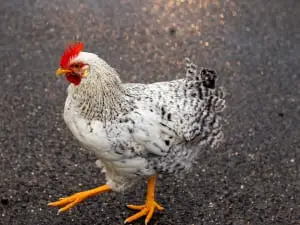
What you think are odd chicken behaviors may sometimes be normal chicken behaviors, but sometimes, odd chicken behaviors do actually signal that there is an issue with the bird.
A chicken shaking its head and stretching its neck means that there is an issue with the bird. This article explores what’s going on
Table of Contents
Chicken shaking head and stretching neck:
A change in your chicken’s behavior is cause for alarm, if your bird is shaking its head and stretching its neck then the bird may have gapeworm
What is gapeworm:
Gapeworms are parasitic worms that infect birds like chickens, pheasants, quail, peafowl, guinea fowl, and turkeys.
These worms infect birds and make their way into the bird’s trachea where they attach and feed on the bird’s blood.
If left for long enough, the gapeworms will keep reproducing, and will eventually fill up the trachea of the bird, close it off and suffocate the bird.
These worms will also cause inflammation in the bird’s trachea making it more difficult for the bird to breathe.
Birds shake their heads in an effort to get rid of something that they can’t reach, in this case, the bird will shake its head to try to get rid of the gapeworms in its throat.
The worms can also cause irritation in the bird’s trachea making the birds shake their heads. Your infected birds will stretch their necks as a way of gasping for air because the worms are suffocating them.
Transmission:
Transmission can happen when birds eat infected gapeworm hosts like earthworms, slugs, snails, and other insects like flies and cockroaches.
The birds can also catch this illness if they come into contact with gapeworm eggs, these eggs can contaminate soil or be present in the droppings of other birds.
Healthy chickens can become infected with these worms while looking for food.
Once infected, the eggs will move to the bird’s intestines and then hatch into larvae.
After hatching some larvae will be passed through the bird’s feces and other larvae will make their way into the bird’s lungs and bronchi.
The larvae in bird’s lungs will move into the trachea after developing. The worms will look for mates in the bird’s trachea and then they will reproduce and lay eggs in the trachea and the cycle will continue.
Some eggs will also be coughed out and will contaminate the soil and surfaces where other birds will pick them up
Symptoms:
In addition to the bird shaking its head and stretching its neck, other symptoms of gapeworm in chickens include:
- Coughing and sneezing (as a way to get the worms out of the trachea)
- Gaping (as a way to get more air into the bird’s body)
- Open mouth breathing (as a way to get more air in)
- Labored breathing (as a way to get more air in)
- Dullness of the eyes (showing the bird’s general poor health)
- Gurgling when breathing (as a result of gapeworms in the bird’s lungs)
- Lethargy (showing the general unwellness of the bird)
Treatment:
Taking your bird to the vet to be diagnosed and to get advice on an effective worming treatment is recommended.
The vet can take a sample of the bird’s feces and view it under a high-powered microscope to see if gapeworm eggs are present. Doing this will also help your vet figure out the extent of the infection.
If you can’t get your bird to the vet you can treat the bird at home:
You can use your bird’s behavior as a way of figuring out if the bird does in fact have gapeworm.
You can treat the bird using dewormers. The dosage you’d need to use will depend on the severity of the infection.
Because treating the birds with a strong dewormer will kill all the worms at once you’d need to do this in parts.
Killing all the worms at once will release all the worms from the trachea at once and will likely cause a blockage of the bird’s system. Deworming the bird in parts will help to keep this from happening
Some birds will not show any signs of being infected with this ailment so you may need to treat the whole flock, not just the birds who you think are sick.
You’d need to treat the birds for the worms that first infected them, and then treat the birds for the worms that developed after the initial worms reproduced.
Giving the bird supplemental oxygen is also recommended.
If you enjoyed this article then you may also be interested in other chicken related articles. Here are some articles that you may be interested in: Rooster Having Seizures, Crowless Rooster, Rooster Stopped Crowing And Mating, Rooster With A Broken Neck, Chicken Seizure

